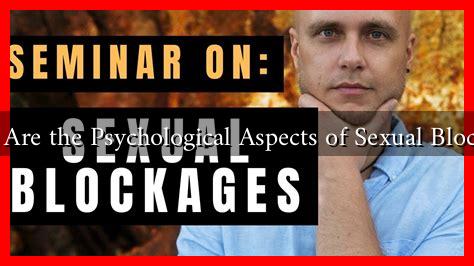-
Table of Contents
What Are the Psychological Aspects of Sexual Blockage?
Sexual blockage, often referred to as sexual dysfunction, encompasses a range of issues that can hinder an individual’s ability to engage in sexual activity or experience sexual pleasure. While physical factors such as hormonal imbalances or medical conditions are often discussed, the psychological aspects of sexual blockage are equally significant. Understanding these psychological dimensions can provide valuable insights into treatment and recovery.
Understanding Sexual Blockage
Sexual blockage can manifest in various forms, including:
- Low libido or lack of sexual desire
- Inability to achieve or maintain an erection
- Difficulty reaching orgasm
- Pain during intercourse
These issues can stem from a combination of psychological, emotional, and relational factors. Addressing the psychological aspects is crucial for effective treatment and recovery.
The Role of Psychological Factors
Several psychological factors can contribute to sexual blockage, including:
- Anxiety: Performance anxiety is a common issue that can lead to sexual dysfunction. The fear of not meeting one’s own or a partner’s expectations can create a cycle of stress that inhibits sexual performance.
- Depression: Mental health conditions like depression can significantly impact libido and sexual function. Individuals may experience a lack of interest in activities they once enjoyed, including sex.
- Past Trauma: Experiences of sexual abuse or trauma can lead to long-lasting psychological effects, including fear and anxiety surrounding sexual activity.
- Relationship Issues: Conflicts, lack of communication, or unresolved issues within a relationship can create emotional barriers to intimacy.
Case Studies and Statistics
Research indicates that psychological factors play a significant role in sexual dysfunction. A study published in the Journal of Sexual Medicine found that nearly 40% of men and 63% of women reported experiencing sexual dysfunction at some point in their lives, with psychological factors being a leading cause.
In a case study involving a 35-year-old woman suffering from low libido, therapy revealed that her lack of interest in sex was linked to unresolved feelings of inadequacy stemming from childhood experiences. Through cognitive-behavioral therapy (CBT), she was able to address these feelings, leading to a significant improvement in her sexual desire.
Strategies for Addressing Psychological Aspects
Addressing the psychological aspects of sexual blockage often requires a multifaceted approach. Here are some effective strategies:
- Therapy: Engaging in individual or couples therapy can help address underlying psychological issues. Therapists can provide a safe space to explore feelings and experiences that may be contributing to sexual dysfunction.
- Mindfulness and Relaxation Techniques: Practices such as meditation, yoga, and deep-breathing exercises can help reduce anxiety and improve overall emotional well-being.
- Open Communication: Encouraging open dialogue between partners can help alleviate fears and build intimacy, which is essential for a healthy sexual relationship.
- Education: Understanding sexual health and dysfunction can empower individuals and couples to seek help and explore solutions.
Conclusion
Sexual blockage is a complex issue that often involves significant psychological components. By recognizing the role of anxiety, depression, past trauma, and relationship dynamics, individuals can take proactive steps toward addressing these challenges. Therapy, mindfulness practices, and open communication are vital tools in overcoming sexual dysfunction. Understanding and addressing the psychological aspects of sexual blockage not only enhances sexual health but also contributes to overall emotional well-being and relationship satisfaction.
In summary, tackling sexual blockage requires a holistic approach that considers both physical and psychological factors. By fostering a supportive environment and seeking professional help, individuals can reclaim their sexual health and enhance their intimate relationships.

